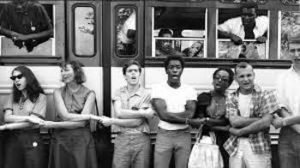
The energy of youth :)
*Freedom Summer is briefly described on this date in 1964. Sometimes referred to as the Mississippi Summer Project, it was a volunteer campaign aimed at combating voter suppression in the United States. Its launch was to register as many Black voters as possible in Mississippi.
Blacks had been cut off from voting since the turn of the century due to barriers to voter registration and other laws. The project also established dozens of Freedom Schools, Freedom Houses, and community centers in small towns throughout Mississippi to aid the local Black population.
Freedom Summer was built on years of earlier work by thousands of Blacks, connected through their churches, who lived in Mississippi. The project was organized by the Council of Federated Organizations (COFO), a coalition of the Mississippi branches of the four major civil rights organizations (SNCC, CORE, NAACP, and SCLC). Most of the impetus, leadership, and financing for the Summer Project came from the SNCC. In 1963, SNCC organized a mock "Freedom Vote" designed to demonstrate the will of Black Mississippians to vote, if not impeded by terror and intimidation.
The Mississippi voting registration procedure at the time required Blacks to fill out a 21-question registration form and to answer, to the satisfaction of the white registrars, a question on the interpretation of any one of 285 sections of the state constitution. The registrars ruled subjectively on the applicants' qualifications and decided against most Black individuals, not allowing them to register.
Additionally, in 1963, volunteers established polling places in Black churches and business establishments throughout Mississippi. After registering on a simple registration form, voters would select candidates to run in the following year's election. Candidates included Rev. Edwin King of Tougaloo College and Aaron Henry from Clarksdale, Mississippi. Local civil rights workers, volunteers, and students from northern and western universities organized and conducted a mock election, in which tens of thousands of people participated. More than 1,000 out-of-state volunteers participated in Freedom Summer alongside thousands of Black Mississippians. Volunteers were the brightest of their generation, who came from the best universities from the biggest states, mostly from cities in the North (e.g., Chicago, New York City, Detroit, Cleveland, etc., and West, Berkeley, Los Angeles, Portland, Seattle, etc., usually were rich, 90 percent were white.
Although SNCC's committee agreed to recruit only one hundred white students for the project in December 1963, white civil rights leaders, such as Allard Lowenstein, recruited many white volunteers to bring more attention. Two one-week orientation sessions for the volunteers were held at Western College for Women in Oxford, Ohio (now part of Miami University), from June 14 to June 27, after Berea College backed out of hosting the sessions due to pressure from alums.
Organizers focused on Mississippi because it had the lowest percentage of any state in the country of Blacks registered to vote, and they constituted more than one-third of the population. In 1962, only 6.7% of eligible Black voters were registered to vote. Southern states had effectively disenfranchised most Blacks and many poor whites from 1890 to 1910, bypassing state constitutions, amendments, and other laws that imposed burdens on voter registration: charging poll taxes, requiring literacy tests administered subjectively by white registrars, making residency requirements more difficult, as well as elaborate record-keeping to document needed items. They maintained this exclusion of Blacks from politics well into the 1960s, which extended to excluding them from juries and imposing Jim Crow segregation laws for public facilities. Most of these methods survived US Supreme Court challenges, and if overruled, states quickly developed new ways to exclude Blacks, such as using grandfather clauses and white primaries.
In some cases, would-be voters were harassed economically and by physical assault. Lynchings had been high at the turn of the century and remained a persistent issue for years. During the ten weeks of Freedom Summer, several other organizations supported the COFO Summer Project. More than 100 volunteer doctors, nurses, psychologists, medical students, and other medical professionals from the Medical Committee for Human Rights (MCHR) provided emergency care for volunteers. Local activists taught health education classes and advocated improvements in Mississippi's segregated health system. Volunteer lawyers from the NAACP Legal Defense Fund Inc ("Ink Fund"), National Lawyers Guild, Lawyer's Constitutional Defense Committee (LCDC), an arm of the ACLU, and the Lawyers' Committee for Civil Rights Under Law (LCCR) provided free legal services handling arrests, freedom of speech, voter registration and other matters.
The Commission on Religion and Race (CORR), part of the National Council of Churches (NCC), brought Christian and Jewish clergy and divinity students to Mississippi to support the work. In addition to offering traditional religious support to volunteers and activists, ministers and rabbis engaged in voting rights protests at courthouses, recruited voter applicants, and accompanied them to register. They also taught in Freedom Schools and performed office and other support functions. Bob Moses directed the summer project.